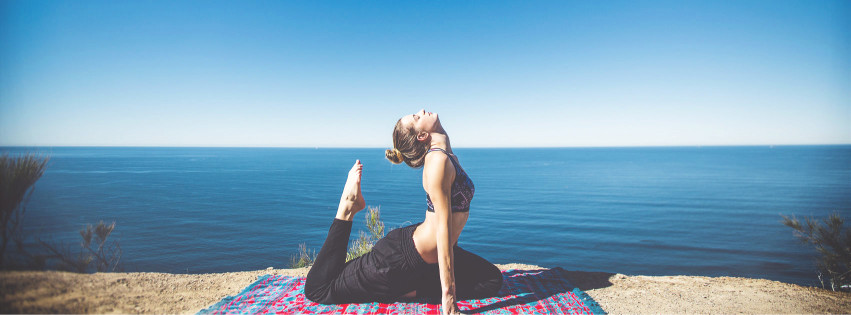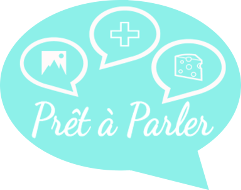Did your holiday feasting have an impact on your tour de taille (waist)? We often eat more than our fair share over the Holidays, but isn’t it what it’s all about? Family, food, and festivities? Mais oui!
The good news is that attending a fitness class given in French is a great way to improve your basic knowledge of this beautiful language!
I did test this ”language bootcamp” when I was living in Munich, Germany. It did really help to improve my German so I could better enjoy my everyday life in Bavaria.
One of my favourite classes was yoga. After a few lessons, I started associating the words I was hearing with the movements and body parts used during the exercises. It took me some time as I am more of a visual person than an auditory one, but I eventually got the hang of it! (Between you and me, even here in Geneva, I still have to look at the teacher to make sure I’m doing the right thing!)
Would you like to improve your French languages skills while practicing your favorite sport?
Here are 5 Great Tips to Survive A Yoga Class in French

1. Le vocabulaire du yoga
Are you already familiar with the body parts terminology in French? It’s always a good idea to review it as you never know when you might need it! (Think doctor’s or dentist’s appointment, hospital, other fitness classes, etc.)
Les parties du corps:
- La respiration (the breath)
- (Le dessus de) la tête. ((the top of the) head)
- Le front. (the forehead)
- L’oeil / les yeux. (the eye / eyes)
- Les sourcils. (the eyebrows)
- Les oreilles. (the ears)
- Le nez. (the nose)
- La bouche. (the mouth)
- Les lèvres. (the lips)
- La langue. (the tongue)
- Le menton. (the chin)
- Les dents. (the teeth)
- La mâchoire. (the jaw)
- Les joues. (the cheeks)
- Le cou. (the neck)
- Les épaules. (the shoulders)
- Les omoplates. (the shoulder blades)
- Les bras. (the arms)
- Les coudes. (the elbows)
- Les avant-bras. (the forearms)
- Les poignets (the wrists)
- Les mains. (the hands)
- Le bout des doigts. (the tip of the fingers)
- Le bas / haut du dos. (the lower / upper back)
- La colonne vertébrale. (the spine)
- La poitrine. (the chest)
- Le ventre. (the belly)
- La cage thoracique. (the ribcage)
- Les poumons. (the lungs)
- Le plexus solaire. (the solar plexus)
- Le nombril. (the navel)
- Les hanches. (the hips)
- La taille. (the waist)
- Le périnée. (the pelvic muscles, for women: term used a lot in pilates)
- Les fesses. (the buttom)
- Les jambes. (the legs)
- Les cuisses. (the thighs)
- Les genoux. (the knees)
- Les tibias. (the shins)
- Les mollets. (the calves)
- Les chevilles. (the ankles)
- Les pieds. (the feet)
- La pointe des pieds. (the tip of the toes)
- Les talons. (the heels)
- Les orteils. (the toes)
2. Les verbes du yoga
Make sure to understand what the instructor really asks you to do to maximise the benefits of your yoga or other fitness classes. That way, you will avoid tensing your muscles when being asked to relax them or breathing out when you should be breathing in!
- respirer par le nez / la bouche (to breathe through your nose / mouth)
- inspirer (to breathe in)
- expirer (to breathe out)
- serrer (to tense)
- tendre (to extand)
- (se) détendre (to release (the tension))
- lever (to lift)
- monter (to lift, go up)
- descendre (to go/put down)
- se mettre à genoux (to kneel)
- se lever (to get up)
- se coucher (par terre / sur le tapis / le plancher) (to lie (on the ground / mat / floor))
- rapprocher le ballon de soi (to bring the ball close to you)
- éloigner le ballon de soi (to push the ball away from you)
- pousser (to push)
- tirer (to pull)
- enrouler la colonne (to roll down the spine)
- dérouler la colonne (to roll up the spine)
- se tourner / coucher sur le côté (to turn / lie on your side)
- tourner (les poignets) (to rotate your wrists)
- plier les genoux (to bend (the knees))
- déplier, étendre, allonger (to stretch out)
- garder les genoux serrés (to keep your knees together)
3. L’impératif
Like in English, we use the imperative form of the verb to give instructions and orders in French.
There are three forms of the French imperative, and these correspond to tu, nous and vous. Nous is more rarely used and works in the same way as “let’s” in English.
To form the imperative, you simply have to use the present forms for tu, nous, and vous without mentioning these pronouns anymore.
- Essaye/Essaie de rapprocher ton nez vers ta cuisse. (Try to bring your nose closer to your thigh.)
- Passons maintenant aux exercises au sol. (Let’s now do some exercises on the ground.)
- Allongez-vous sur le dos, sur le matelas. (Lie on your back, on the mat.)
- Levez la tête vers le ciel. (Lift your head up towards the sky.)
- N’oubliez pas de respirer! (Don’t forget to breathe!)
4. Instructions typiques au cours de yoga
"Bonjour à tous et à toutes et bienvenus au cours de yoga avec Isabelle!
Nous allons commencer par des respirations lentes et profondes. Inspirez profondément par le nez et expirez lentement par la bouche.
Sentez votre cage thoracique se remplir d’air au-dessus de votre tête, du troisième oeil jusqu’au plexus solaire.
Fermez les yeux et profitez de ce moment de bien-être.
Maintenant, levez les deux mains vers le ciel le plus loin possible pour vous étirer jusqu’au bout des doigts. Mettez-vous sur la pointe des pieds et stretchez au maximum.
Enroulez la colonne vertébrale vers le bas, vertèbre après vertèbre. N’oubliez pas de respirer et de savourer ce moment de détente."
5. Practice Makes Perfect!
Click here to test your yoga vocabulary!
Isabelle
As a native Québécoise, born to a Franco-Belgian family, now living in Nyon with her two children, Isabelle is no stranger to the expat reality! Trained as a professional opera singer, her passion for arts and languages led her to become an ambassador of the French language & francophone culture, i.e. a French Teacher!
She founded Prêt à Parler in January 2015. Since then she's been hard at work helping English-speaking learners from the international community of Suisse romande make French part of their everyday life! Prêt à Parler's mission is based on what Isabelle does best: helping busy professionals and parents improve their French language skills by providing a high quality, eco-friendly, fun, no-nonsense approach to learning French online!







0 comments